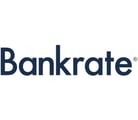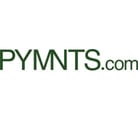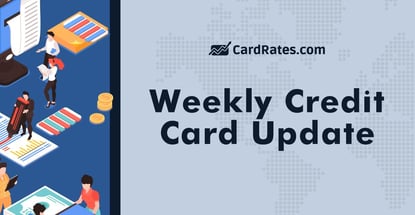For media inquiries on these stories and more, contact credit card expert and industry analyst Bill Hardekopf at (205) 985-9725 or billh@cardrates.com.
1. Americans’ Average Credit Score Hits 13-Year High

Despite difficult times for Americans’ finances during the coronavirus pandemic, average credit scores have continued to climb to a 13-year high. According to Experian’s 12th annual State of Credit report, the average Vantage score climbed from 688 in 2020 to 695 in 2021 and the median Vantage score climbed from 697 in 2020 to 701 in 2021.
The score improvements were supported by fewer missed payments, lower credit utilization rates, reduced card balances and total debt levels year-over-year and prior to the pandemic’s arrival.
• Story By: Lucas Manfredi, Fox Business
2. Biden Takes on Visa, Mastercard Over Debit Card Fees

The Biden administration wants to loosen the grip that Visa and Mastercard have on routing debit card payments in online transactions and the billions in so-called interchange fees that come with it.
The Justice Department’s Antitrust Division and the Federal Trade Commission endorsed a May proposal by the Federal Reserve to reopen Dodd-Frank Act rules that capped the fees retailers pay and required banks and other debit card providers to offer more payment network choices for routing transactions. The Fed wants to expand the 2011 rules to cover rapidly growing “card-not-present” transactions—primarily online shopping and automatic bill payments—to rein in alleged anticompetitive behavior by giants like Visa and Mastercard, which process roughly 75% of all debit transactions.
• Story By: Evan Weinberger and Siri Bulusu, Bloomberg Law
3. Bankrupts Hold Flat, Suggesting Clear Sailing for Credit Cards into 2022

Bankruptcies directly impact credit card profitability. Once a notice hits the credit card issuer, they must reclassify the account and remove the asset from the balance sheet. This action diminishes earnings immediately, and all collection activities must cease.
The creditor may have a right to collect but rarely succeeds unless there is a fraud-related issue. The recently published numbers by EPIQ, a research firm specializing in bankrupt tracking, indicate that Chapter 7 filings were down in July, falling nearly 10% from 23,524 in June 2021 to 21,540. Chapter 13 filings rose slightly, but the critical issue is that the aggregate number was flat.
• Story By: Brian Riley, Payments Journal
4. Amazon is Bringing Cashierless Tech to Whole Foods

Whole Foods Market announced it plans to open two stores next year equipped with Amazon’s Just Walk Out cashierless technology. The locations in Washington, D.C., and Sherman Oaks, California, will also offer shoppers the alternative of paying via self-checkout machines or with a cashier at the stores’ customer service desk.
This continues Amazon’s trend of focusing on technology and adding payment options as it tries to differentiate its grocery stores in crowded markets across the U.S. Whole Foods stores began testing Amazon One earlier this year. Amazon Fresh stores, meanwhile, have introduced smart cards at numerous locations.
• Story By: Jeff Wells, Grocery Dive
5. Facebook Admits “Trust Deficit” as It Looks to Launch Digital Wallet

Facebook says it’s finally ready to launch its most ambitious new product in years: a digital wallet called Novi. But the man leading the charge says Washington could stand in its way.
Facebook needs to convince regulators skeptical of its power that it’s a good idea. Much of Facebook’s broader ambitions, like building a “meta-verse” and advancing its shopping platform, are tied to innovations in payments.
• Story By: Sara Fischer and Mike Allen, Axios
6. How Bad Credit Affects Mental Health

There’s also a link between debt and mental health. According to the Money and Mental Health Policy Institute, 46% of people who have debt problems also have mental health problems. And 86% of people who experienced mental health problems said those were made worse by their financial situation.
According to the Kaiser Family Foundation, 4 in 10 American adults experienced anxiety or depression during the pandemic. That’s up from the 1 in 10 Americans who reported anxiety or depression in 2019.
• Story By: Rebecca Lake, Bankrate
7. Mastercard Makes a Big Bet on Crypto, Buying Blockchain Analytics Start-Up CipherTrace

Mastercard has agreed to acquire blockchain analytics start-up CipherTrace, in the latest sign of how major companies are warming to cryptocurrencies. The payments giant said it entered into an agreement to buy CipherTrace for an undisclosed amount.
CipherTrace develops tools that help businesses and law enforcement root out illicit digital currency transactions. The company’s competitors include New York-based Chainalysis and London start-up Elliptic.
• Story By: Ryan Browne, CNBC
8. CIBC Nabs Costco Credit Card Partnership in Canada

Canadian Imperial Bank of Commerce will become the issuer of credit cards at Costco’s stores in Canada as the membership-only retail chain ends a previous deal with Capital One. CIBC said it has reached a long-term agreement with Costco Wholesale that is expected to start early next year.
The Toronto-based bank did not disclose the length of the contract or its financial terms. CIBC will also acquire from Capital One a portfolio of more than $3 billion in existing card balances. For CIBC, which offers travel-related credit cards with Air Canada, the deal offers a way to attract consumers who are more interested in earning rewards for their spending on groceries and other household essentials. The bank said that the deal reflects a strategic focus on growing its Canadian consumer franchise.
• Story By: Kevin Wack, American Banker
9. Dark Web Prices Drop for Credit Cards But Soar for PayPal Accounts

Credit cards are sold on the dark web either as digital items or physical clones of real cards. Prices for cloned cards are typically higher because the seller must have the necessary equipment to recreate a stolen card. The average price for just the credit card number, CVV, expiration date, cardholder name and postal code is $17.36.
But the average price for a physical, cloned card is almost 10 times higher at $171, according to a Comparitech report. Overall, average prices for credit cards fell this year by 27% compared with a similar study conducted eight months ago. Selling prices for credit cards vary based not just on the brand of card but on the credit limit for the card. Accounts for PayPal are more lucrative than credit cards. The average price of a PayPal account on the dark web is $196.50.
• Story By: Lance Whitney, TechRepublic
10. What To Do When You Get Sued for Credit Card Debt

Seventy million Americans struggle with debt in collections status according to a study by the Consumer Financial Protection Bureau. If you default on your credit card debt and are unable or unwilling to work out an arrangement with your credit card company, you risk being on the receiving end of a debt collection lawsuit.
Getting sued by a creditor or collection agency can be an unsettling experience, especially if you don’t know what to expect. Yet no matter how overwhelmed you feel, ignoring a courthouse summons is a mistake. Learn how debt collection lawsuits work, and discover the steps you can take if a company sues you for unpaid credit card debt.
• Story By: Dia Adams and Michelle Black, Forbes
11. Seven Years Later, Only 6% of People with iPhones in the U.S. Use Apple Pay In-Store When They Can

Seven years post-launch, new PYMNTS data shows that 93.9% of consumers with Apple Pay activated on their iPhones do not use it in-store to pay for purchases. That means only 6.1% do. After seven years, Apple Pay’s adoption and usage isn’t much larger than it was 2015 (5.1%), a year after its launch, and is the same as it was in 2019, the last full year before the pandemic.
Apple Pay’s stiffest competition in the store, ironically, remains that piece of plastic – the raison d’etre for its development and the intended target of its super-hyped potential in 2014. In fact, the growth in total Apple Pay transactions since 2015 has come almost entirely from more stores having contactless terminals to accept it, more people having new iPhones that can use it, and the overall growth in retail transactions. And almost none of that growth comes from more iPhone users wanting to use it instead of plastic cards.
• Story By: Karen Webster, PYMNTS
12. T-Mobile Data Breach 2021: Here’s What It Means for Securing Your Data

The alleged hacker behind T-Mobile’s latest cyberattack has spoken out about the August hack. The breach includes names, driver’s license numbers, Social Security numbers and device identification (IMEI and IMSI) numbers for subscribers, former customers and even prospective customers. The wireless carrier is reportedly facing three lawsuits that stem from the breach.
John Brinns, the 21-year-old who claims responsibility for the hack, detailed the breach that affected over 54 million people. Brinns shared that T-Mobile had unprotected routers and weak spots in the company’s internet addresses that gave him access to over 100 servers.
• Story By: Jason Cipriani, CNet
Advertiser Disclosure
CardRates.com is a free online resource that offers valuable content and comparison services to users. To keep this resource 100% free, we receive compensation for referrals for many of the offers listed on the site. Along with key review factors, this compensation may impact how and where products appear across CardRates.com (including, for example, the order in which they appear). CardRates.com does not include the entire universe of available offers. Editorial opinions expressed on the site are strictly our own and are not provided, endorsed, or approved by advertisers.





![3 FAQs: ATM Card vs. Debit Card vs. Credit Card ([updated_month_year]) 3 FAQs: ATM Card vs. Debit Card vs. Credit Card ([updated_month_year])](https://www.cardrates.com/images/uploads/2016/05/atm-card-vs-debit-card-vs-credit-card--1.png?width=158&height=120&fit=crop)
![What Card is in the Jennifer Garner Credit Card Commercial? ([updated_month_year]) What Card is in the Jennifer Garner Credit Card Commercial? ([updated_month_year])](https://www.cardrates.com/images/uploads/2018/05/jennifer-2.jpg?width=158&height=120&fit=crop)
![Can You Pay a Credit Card with a Credit Card? 3 Ways Explained ([updated_month_year]) Can You Pay a Credit Card with a Credit Card? 3 Ways Explained ([updated_month_year])](https://www.cardrates.com/images/uploads/2017/02/card-with-card-2.png?width=158&height=120&fit=crop)



![3 Key Differences: Charge Card vs. Credit Card ([updated_month_year]) 3 Key Differences: Charge Card vs. Credit Card ([updated_month_year])](https://www.cardrates.com/images/uploads/2017/03/charge-card-vs-credit-card.jpg?width=158&height=120&fit=crop)